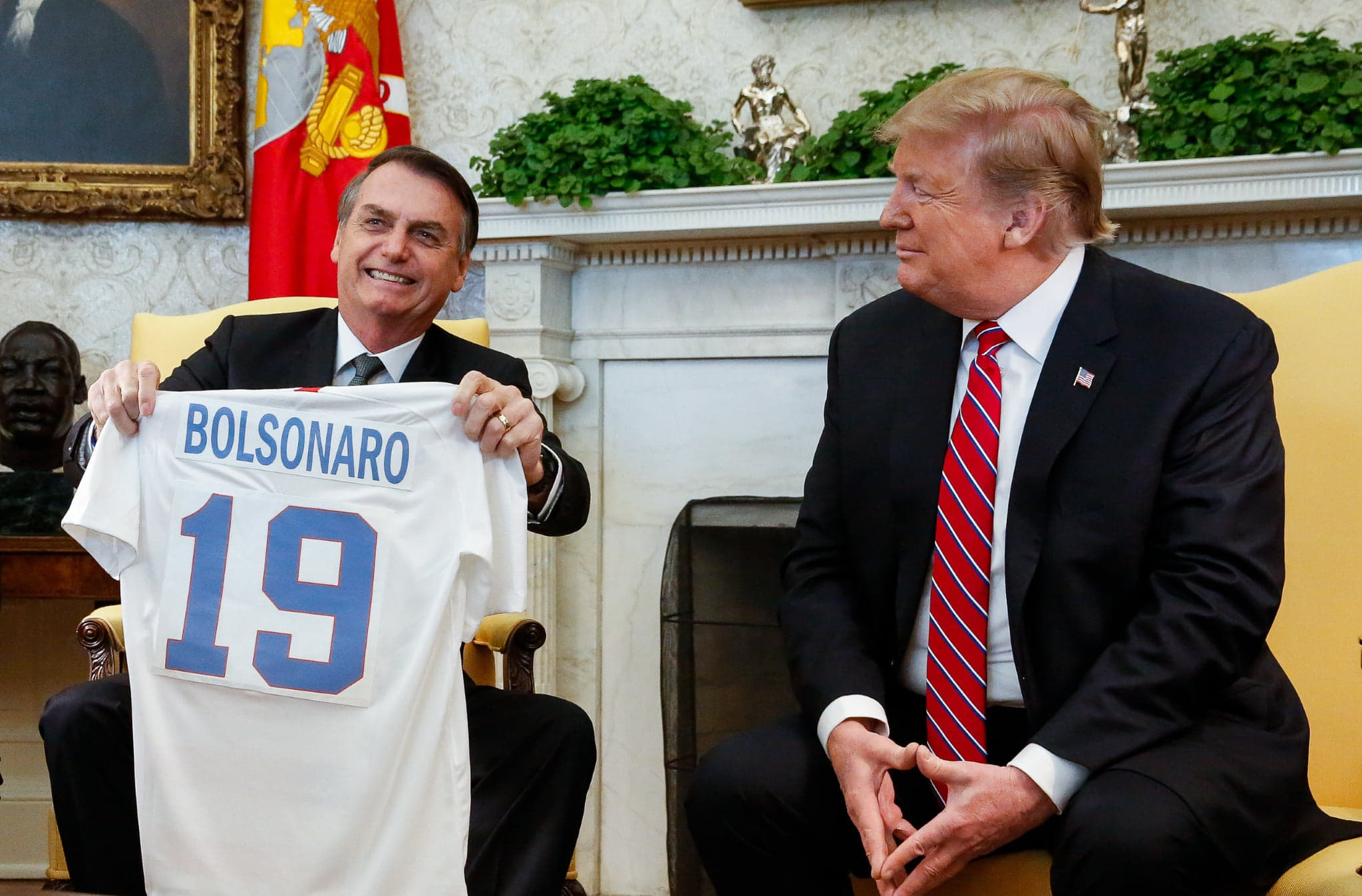
The Emergence of Populism and the Delegitimation of Facts: a very global issue
Until the beginning of the digital era, whenever authoritarian governments felt uncomfortable with the critics, they would engage in the censorship of these so-called deserters of the nation and in the hegemonic control of the media, the academia and other institutions related to the production or the spread of information. In the twenty-first century, populist movements currently in power or even those that were not so successful in the last elections seem to demonstrate a common discomfort when faced with specific democratic values – such as the possibility of dissent – however, they no longer employ old-fashioned strategies to hide the parts of reality that they do not want to be shown to the public. As developed further in this article, populist leaders in the digital era who share a common authoritarian mentality can exploit more sophisticated tactics to silence their critics.
Oddly enough, the dynamics of the media in the twenty-first century itself are what allow, to some extent, the use of refined strategies by populist leaders to silence them. Populists in power do not need to close down media companies that displease them and the populists who want to hold office could never defend such practices in a still democratic society. Adopting a different tactic, what these leaders attempt to achieve is the delegitimation of these institutions, so that no matter what they say, populist supporters would not believe them anyway.
A free press is one of the basic features needed for a well-functioning democracy. But what is the worth of a press which is still free, if the public no longer believes in what it has to say? It is essential to understand the relationship between populism and the media in the twenty-first century, which is not necessarily a causal one, but rather a symptomatic one. This means that the media is not the variant that caused populism, but this institution is certainly involved among various other factors – such as globalization, socio-economic anxiety and rapid cultural changes – in the emergence of these political movements.
Populism and the traditional media: a love & hate relationship
In a time of rapid cultural and socio-economic changes produced by globalization or by modernity itself, populism seems to offer an appealing discourse to a significant part of national publics. Either in countries such as the United States of America, France and Italy, through a furious anti-globalization and xenophobic rhetoric, or in countries such as Brazil, through a reactionary agenda, populist leaders have proven to have an expertise when it comes to channeling frustrations. Finding solutions is not necessarily one of their priorities, but they sure know how to point out problems like no other movement in the political market.

In the absence of a coherent political projects, popularity becomes the foundation of populist movements. This is the reason why even when these movements come to power – such as in the USA, Brazil or briefly in Italy – they adopt a strategy known as permanent campaign, which means that in the expense of respecting the formality that holding office demands, populist leaders continue to demonstrate a combative behaviour in order to keep their support bases aroused, be it through furious tweets or through inflamed public discourses.
When politics seems to embrace pop-culture, the understanding of its relationship with the media becomes ever more important in an era in which popularity is strongly related to media presence. Therefore, it is important to recognise the existence of two different media modalities, the traditional media and the new media – which include social networks, tabloids and blogs. In the book Twenty-First Century Populism, Mazzoleni explains that while the traditional media holds a more critical position regarding populist movements, being closer to the political establishment, the new media – which tend to be more purely commercial – present themselves as more welcoming to populist leaders and their sensationalist feature, displaying a relationship of near interdependence with these movements. However, in spite of these differences, both modalities of media seem to help, to some extent, the emergence of populism – be it intentionally or unintentionally.
The traditional media serve the populist project in two different unintentional but rather significant ways. At first, responding to the public demand and to an evermore competitive media market, traditional media engage in the exposure of the most controversial aspects of politics and social life in general. Through a ceaseless coverage of corruption cases and controversial politics, traditional media contribute to a general malaise of the public opinion regarding politics. If all one sees in the media about politics is corrupt politicians and dubious policy decisions, one will easily be convinced that the whole political class is corrupt – as defended by the anti-elitist discourse of former candidates such as Donald Trump, Jair Messias Bolsonaro and Marine Le Pen, whose success depended strongly on the idea that every politician is corrupt except, of course, for themselves. It is important to clarify that this is not to say that the media should not cover the shameful side of politics or that politicians should not be held accountable for reprehensible behaviours, but rather to establish that if this is the only aspect of politics covered by the media in search for audience, there can and there will be unexpected consequences.
Furthermore, it is not only politics that can receive a somewhat unfair coverage by the media. The traditional media, especially the televised one, can also communicate in an excessive manner, aspects of the social life that produce a sensation of fatalism. The relentless coverage of topics related to immigration and public security contribute to a feeling of shared vulnerability that will be later mobilized by populist leaders through their appealing nationalist and law and order rhetoric. In France, for example, whenever an immigration crisis occurs, Marine Le Pen is viciously invited by the media to talk about it, thus shaping the political agenda.
Therefore, it is possible to conclude that through the sensationalization of the political and social life, traditional media contributes to the rise of populist leaders. However, this contribution is rather involuntary, once this modality of media is closer to the establishment and tends to defend the status quo. Thereby, when populist leaders achieve a certain level of popularity and need to be taken more seriously, traditional media normally adopts a strong critical position to these movements and, contradictorily, it is exactly through its disapproval that traditional media will help, once again, to clear the way for populism. This might seem surprising, but through the continuous denouncing of populist leaders, traditional media not only guarantees free publicity, but they also help them build an image of underdog – the outsider that is not accepted by the system because he or she has come to put an end to the wicked establishment.
In the end, it is the constant denouncing of populist leaders and movements by the traditional media that validates the anti-system status of candidates that have actually always been part of the system. Additionally, it is precisely this dynamics that facilitates the framing of these media outlets as being part of the immoral elite and, therefore, not worthy of public credibility. According to a research conducted by the Pew Research Center, in the United States, liberals and conservatives do not inhabit the same media universe, with conservatives putting their trust in only one big media platform, Fox News, which has supported the Trump campaign from the beginning. On the other side of the Atlantic, in Europe, the situation is not much different, with supporters of populists parties in every studied country, presenting a high level of distrust in the traditional media.
The Distrust in the Traditional Media: the United States and Europe

In this context, populists do not censorship, but rather adopt a strategy that consists of delegitimizing the opposition media into oblivion. Through discourses defending the existence of a biased media determined only to keep them and, therefore, the people out of the power, populist leaders were able to construct an almost foolproof strategy in which nobody can tell them wrong, because the people who do so are part of the corrupt elite.
Populism and the new media: a successful affair
The populist relationship with the media does not always need to be a troubled one. Once delegitimized the critics and, among them, the traditional media, where do populist supporters get their information from? Populist movements have been agile to recognise the potential of political mobilization provided by the new media platforms, especially social networks, and have taken the front line in the use of these new tools.
When the internet first arrived, there was an expectation that it would serve the noble mission of democratizing information, with the inclusion and participation of a larger part of the population in the democratic debate. There was finally a place where everyone could express their preferences and, ultimately, be heard. In the digital space, every single person could consume and produce information. However, the fact that everyone could from that moment on express their preferences did not mean that they would necessarily express democratic ones. It is important to remember that one of the most surprising features of democracy is the right of citizens to express anti-democratic values. Additionally, the fact that on the internet everybody has a voice, does not mean that all voices are equally heard. In this context, populist leaders and supporters seem to have quickly identified this dynamic, making sure that the voice that was mostly heard, was theirs.
The way in which social networks personalize the content to which the user will be exposed is certainly one of the reasons why a predominance of radical movements and ideas in social media can be observed. Through the use of algorithms, a selective exposure of content guarantees that the users will mostly have access to content that pleases them, which means that in the political or even moral arena, the users will often be exposed to ideas that confirm their prior perception of reality. This prompts an ever-growing gap between reality and the perception that individuals make of it, turning every challenge surrounding the public space into a catastrophe, and ultimately leading to an increased polarized society and an ever-growing support to combative leadership.
Additionally, if the traditional media contributes to a feeling of vulnerability through the coverage of the most polemical aspects of social and political lives, social networks, blogs and tabloids accelerate this impression of great insecurity, serving once again the goals of leaders who practice the politics of redemption. These new medias operate by the logic that the more one post is accessed the more it is publicized, and although the traditional media is also submitted to these imperatives, it is at least partially limited by bureaucratic procedures that can keep them from simply fabricating lies.
Here, it is important to point out that not all alternative media engage in the sensationalization of public life or in the production of lies. Some of these medias can have a very positive progressive impact on society, actually democratizing the public debate. However, once they decide to follow only the market imperatives related to the production and propagation of contents, there is no bureaucratic procedure to constrain them. At the very list, one mainstream journalist who writes a false story can be held accountable for his or her actions, but when it comes to social media, blogs and tabloids, many times the author of one post cannot even be identified.
Post-truth: when facts no longer matter
In an environment characterized by a broad public distrust in the traditional media and an ever-growing trust in dubious information often disseminated in the digital space, the relationship society has with the truth seems to have severely changed. At a moment when individuals can have rapid access to numerous versions of reality, all by a touch of the finger, it appears that they have also developed the ability to choose which version they are going to stick with. In this context, truth or facts have become rather contingent concepts.
The anti-elitism endorsed by populism has led to a moment in which facts and truths supposedly determined by the elites are opposed by populist supporters whenever the information seems to contradict populists’ version of reality. Here, it is important to clarify that what makes the populist strategy so unbeatable is the elasticity of the term “elite”. The elite is determined to keep the people out of the power, so if someone contradicts the populist rhetoric it is because this person is part of the elite, and if this person was not part of the elite before, well, he or she is now, because in the end, whoever is opposed to the populist movement constitutes the elite.

In this context, environmentalists, journalists, opposition politicians no matter what they stand for, intellectuals, scientists and virtually anyone with a critical view of the populist leader is part of the elite and is, thereby, not worthy of the people’s attention. In a society evermore dictated by a pernicious antagonism between the “us” and “them” constructed by populism, people become more and more willing to consume false content that confirms their prior ideas and to discredit any piece of information that contradicts them. Thereby, society prepares itself to enter the post-truth era, characterized by “circumstances in which people respond more to feelings and beliefs than to facts”, as defined by the Oxford Dictionary. This means not only that emotional identification is now what determines what is true and what is not, but also that facts – even scientifically-proven ones – are no longer regarded as neutral entities that can be verified. Truths, in their plural form, are partial and subjective.
At a time when personal beliefs become enough proof of reality itself, issues that demand a high level of consent and collective action to be properly addressed present themselves as major challenges. The Israeli thinker, Yuval Noah Harari, illustrates how the behaviour of irresponsible populist leaders hampers the solving of disruptive global emergencies – such as the global health crisis provoked by the COVID-19. The proper spread of honest information is a requirement for collective action which is, in turn, crucial to the solving of global challenges. A society can only address a problem collectively if everybody agrees: first, that there is a problem and second, on what needs to be done to solve it.
However, the distrust in the media and science promoted by reckless leaders creates a barrier to coordinated behaviour and in the same way in which it is very unlikely for a country to build a functional healthcare system overnight, it is also very difficult to rebuild the public’s trust in key institutions when needed. Nevertheless, it is not impossible, and the only way in which governments and the civil society can overcome challenges in the twenty-first century is by reinforcing the institutions which allow people to coordinate and act collectively, for global issues cannot be solved nationally and collective challenges cannot be solved individually.
Giovanna Macieira Rosário
Sources
Bartlett, J. Populism, Social media and democratic strain. In: European Liberal Forum (Org.). European populism and winning the immigration debate. Stockholm: European Liberal Forum, 2014. Chap. 5. p. 99-114. Available at <https://fores.se/populism/>. [Accessed 15 march 2020].
Butcher, P. Disinformation and democracy: the home front in the information war. Brussels: European Policy Centre, 2019.
Gerbaudo, P. Social media and populism: an elective affinity?. Media, culture & society, v. 40, n. 5, p. 745-753, 8 may 2018. SAGE Publications. Available at <http://dx.doi.org/10.1177/0163443718772192> [Accessed 23 april 2020].
Magrani, E. Democracia conectada: a internet como ferramenta de engajamento político-democrático. Curitiba: Juruá – Fgv Direito Rio, 2014. Available at <https://bibliotecadigital.fgv.br/dspace/bitstream/handle/10438/14106/Democracia%20 conectada.pdf> [Accessed 22 april 2020].
Mazzoleni, G. Populism and the media. In Albertazzi, D.; Mcdonnell, D. (Ed.). Twenty-first century populism: The Spectre of Western European Democracy. New York: Palgrave Macmillan, 2008. Chap. 4. p. 49-64.
Mudde, C.. The Populist Zeitgeist. Government and opposition, v. 39, n. 4, p.542-563, sep. 2004. Cambridge University Press (CUP). Available at <http://dx.doi.org/10.1111/j.1477-7053.2004.00135.x.> [Accessed 04 march 2020].
Panizza, F. Introduction: Populism and the Mirror of Democracy. In: Panizza, F. (Ed.). Populism and the mirror of democracy: Verso, 2005. Chap. 1. p. 1-31.
Pew Research Center. The roots of modern nationalism and the populist backlash. Aspen Ministers Forum. Available at <https://www.pewresearch.org/global/2018/07/16/the-roots-of-modern-nationalismand-the-populist-backlash/> [Accessed 6 march 2020].
Oxford University. Oxford learner’s dictionaries. Oxford: Oxford University Press, 2019. Available at <https://www.oxfordlearnersdictionaries.com/definition/english/post-truth> [Accessed 20 August 2019].
Waisbord, S. The elective affinity between post-truth communication and populist politics. Communication research and practice, v. 4, n. 1, p.17-34, 2 jan. 2018. Informa UK Limited. Available at <http://dx.doi.org/10.1080/22041451.2018.1428928> [Accessed 19 April. 2020].
Sismondo, S. Post-truth? Social studies of science, v. 47, n. 1, p.3-6, fev. 2017. SAGE Publications. Available at: <http://dx.doi.org/10.1177/0306312717692076> [Accessed 18 April 2020].
Harari, Y., 2020. Yuval Noah Harari: The World After Coronavirus. Financia Times. Available at: <https://www.ft.com/content/19d90308-6858-11ea-a3c9-1fe6fedcca75> [Accessed 26 March 2020].





No Comment